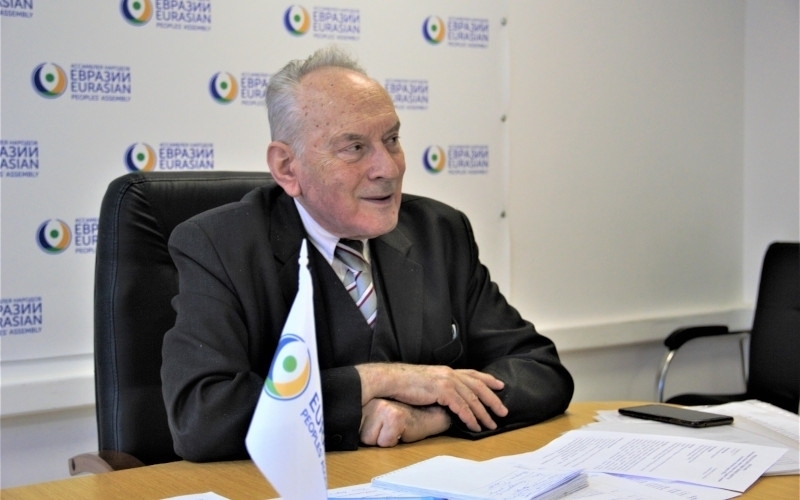
March 23 in Minsk (Belarus) a round table discussed the prevention of the rehabilitation and glorification of Nazism.
Valery Ruzin, Deputy Secretary General of the Eurasian Peoples’ Assembly, spoke at the round table.
Valery Ruzin said that the Eurasian Peoples’ Assembly conducts purposeful work to preserve historical memory, regularly holds sessions of the International Public Forum on Preserving the Memory of the Second World War and the Great Patriotic War:
"We held 15 sessions. The last six were dedicated to the Baltic States, including collaborators, criminals, SS men.
Our partners presented the results of their research – this is an important part of the work to preserve historical memory. I agree with all the participants of the round table that we have no right to forget these monstrous crimes. <...> Time is running out, and today we have the last opportunity to declare the perpetrators of these atrocities."
One of the important topics of the forum was the genocide. For the first time, this topic was raised at the sixth session of the International Public Forum of the Eurasian Peoples’ Assembly in St. Petersburg in December 2020. There, the Director of the Digital History Research Foundation, Egor Yakovlev, for the first time announced sensational materials confirming the existence even before the war of Hitler's plan to destroy 30 million people of the population of the Soviet Union, who were classified as "untermensch" (subhumans). The topic of atrocities and collaboration was continued in the last six sessions of the International Public Forum on the example of Lithuania, Latvia and Estonia.
"Our previous forums voiced the need to create a website of so–called anti–heroes, because the unknown about the crimes of collaborators without a statute of limitations - Latvian SS men - makes it possible to glorify them today," Valery Ruzin said. "In connection with the work carried out, the Eurasian Peoples’ Assembly appealed to the President of Belarus Alexander Lukashenko with a proposal to investigate the genocide against Belarusians."
The purpose of the Assembly activity in this context is the publication of the facts of crimes without a statute of limitations – the international recognition of these crimes and the conviction of those who committed them. The Eurasian peoples’ Assembly believes that it is necessary to create an international tribunal that could consist of representatives of Russia, Belarus, and other countries of the former Soviet Union, which are also winners and have also experienced atrocities. There were soldiers of all nationalities among the prisoners of war.
"We will certainly be able to attract colleagues from Europe who share our positions to participate in this legal process," Valery Ruzin suggested. "After we are able to put the disclosed facts of crimes into legal form, the documents will be transferred to the UN and other international organizations."
The Russian Foundation "Historical Memory" presented the publication "Last Chance for Justice" at a round table in Minsk. Fundamentals of legal prosecution of Nazi criminals from Latvia".
Vladimir Simindey, Head of research Programs at the Historical Memory Foundation, told:
"It was prepared together with my colleagues Alexander Dyukov and Boris Kovalev and is a comprehensive study that consists of a historical and legal reference about the Latvian SS Legion. Its necessity is caused by the fact that in modern Latvia the complicity of Latvian SS men in war crimes is denied."
According to him, the study also examines the criminal activities of Latvian collaborators on the territory of Russia, who killed thousands of civilians in the village of Zhestyanay Gorka in the Novgorod region and on the territory of Belarus during the large-scale punitive operation "Winter Magic", when the Nazis killed about four thousand citizens.
Deputy Secretary General of the Eurasian peoples’ Assembly Valery Ruzin drew attention to the fact that the materials on which Vladimir Simindey's research is based are strictly documentary.
"Working with archives in exposing crimes is extremely important today," Valery Ruzin said. - It needs to be expanded. The Eurasian Peoples’ Assembly together with the Digital History Foundation appealed to the Director of the FSB of Russia, Alexander Bortnikov, who manages the archives, with a proposal to declassify the investigative files of Nazi criminals. We have received a preliminary response. We will continue this work. Now we are preparing a second letter with a proposal to declassify one of the names – the investigative case of the chief of Police of Dnepropetrovsk. It is necessary to make these facts available to specialists and the public."


